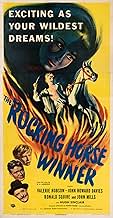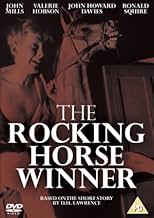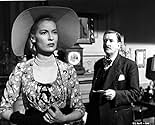IMDb RATING
7.2/10
1.5K
YOUR RATING
A young boy receives a rocking horse for Christmas and soon learns that he is able to pick the winning horse at the races.A young boy receives a rocking horse for Christmas and soon learns that he is able to pick the winning horse at the races.A young boy receives a rocking horse for Christmas and soon learns that he is able to pick the winning horse at the races.
- Director
- Writers
- Stars
Anthony Holles
- Bowler Hat
- (uncredited)
Melanie Mackenzie
- Matilda Grahame
- (uncredited)
Michael Ripper
- 2nd Chauffeur
- (uncredited)
Johnnie Schofield
- 1st Chauffeur
- (uncredited)
Caroline Steer
- Joan Grahame
- (uncredited)
- Director
- Writers
- All cast & crew
- Production, box office & more at IMDbPro
Featured reviews
In London, the teenager Paul Grahame (John Howard Davies) lives with his upper class but financially broken family. His wasteful mother Hester Grahame (Valerie Hobson) is a compulsive buyer, spending all the family money in new expensive dresses, jewels and objects for their home. His father Richard Grahame (Hugh Sinclair) is a gambler, losing money in the horse races. His uncle Oscar Cresswell (Ronald Squire) is permanently covering the Grahame family debts. When the servant Bassett (John Mills) is hired, Paul finds that he can predict the winner of the horses' races rocking his wooden horse. Paul asks Bassett to become his partner, betting their money in the races, trying to prove that he is lucky and silencing the permanent whisper of the house needing more money. But the prize is high and fatal.
"The Rocking Horse Winner" is a dark tale of compulsion of D. H. Lawrence. I have never read his short story, and I did not feel any sexual connotation as mentioned in some reviews that I have glanced. The story is very disturbing and quite unpleasant, with great direction and performances, especially of Valerie Hobson in the role of a compulsive shallow woman. My vote is seven.
Title (Brazil): "O Cavalo Campeão" ("The Horse Winner")
"The Rocking Horse Winner" is a dark tale of compulsion of D. H. Lawrence. I have never read his short story, and I did not feel any sexual connotation as mentioned in some reviews that I have glanced. The story is very disturbing and quite unpleasant, with great direction and performances, especially of Valerie Hobson in the role of a compulsive shallow woman. My vote is seven.
Title (Brazil): "O Cavalo Campeão" ("The Horse Winner")
The dialogue is expectedly very British and good. Though a perfunctory performance was all the needlessly limited role of the father required, all other players did wonderfully.
Interestingly, the story concerns a good, but sybaritic mother's avarice and her loving son's obsessive desire to satisfy it. It also plays into the idea of money as an inherent evil while earning my high praise by not taking this too far. It is also another one of many films I have enjoyed on the fascinating subject of gambling.
Interestingly, the story concerns a good, but sybaritic mother's avarice and her loving son's obsessive desire to satisfy it. It also plays into the idea of money as an inherent evil while earning my high praise by not taking this too far. It is also another one of many films I have enjoyed on the fascinating subject of gambling.
This is about a British family. The mother (Valerie Hobson) spends beyond her means. The father gambles...badly and loses his job. The family is close to bankruptcy when their young son Paul (John Howard Davies) develops this uncanny ability to predict winners in horse races. How does he do it? By riding his rocking horse.
I read the D.H. Lawrence short story back in college in the 1980s and never forgot it. I heard about this film but was afraid to see it...I didn't think there was any way to film the story without it looking stupid. Also this movie is hard to find. I finally did catch it and I was impressed. They managed to take a very dark and strange short story and make an excellent movie out of it. It moves quickly (it's only 90 minutes) and I was never bored for one second. The acting really helps to carry this one. Hobson is just OK as the mother but Davies as the little boy, John Mills as Bassett and Ronald Squire as Uncle Oscar are just great. Ultimately the movie is sad and depressing but just incredible. This was way too ahead of its time to connect with audiences of 1950 and it (sadly) remains unknown to this day. Well worth seeing.
I read the D.H. Lawrence short story back in college in the 1980s and never forgot it. I heard about this film but was afraid to see it...I didn't think there was any way to film the story without it looking stupid. Also this movie is hard to find. I finally did catch it and I was impressed. They managed to take a very dark and strange short story and make an excellent movie out of it. It moves quickly (it's only 90 minutes) and I was never bored for one second. The acting really helps to carry this one. Hobson is just OK as the mother but Davies as the little boy, John Mills as Bassett and Ronald Squire as Uncle Oscar are just great. Ultimately the movie is sad and depressing but just incredible. This was way too ahead of its time to connect with audiences of 1950 and it (sadly) remains unknown to this day. Well worth seeing.
I first saw this film as a pare-teen many years ago and it stuck in my memory all these years; I suppose I identified, at the time, with the idea that events could be somehow manipulated and controlled by sheer intensity. When I recently saw this film on DVD, it still struck a nerve and, as an adult, realized what a strong film it is and why it had been in my memory all these years. Because the file is so old, many of the mannerisms in the movie appear quaint now, but the themes are timeless; sensitive kids sensing parental dysfunction and taking it upon themselves to try and "fix" things. It's interesting to note that John Mills, then a staple in English films, produced the film. I would recommend this film to anyone with a penchant for psychological drama of the old school.
I've seen a few rocking horses in my time, but none that looked like this one. With its predatory teeth, gaping mouth, and flaring eyes, it looks more like Halloween than X-mas. No wonder it's got supposedly demonic powers. But then the social-climbing parents need help of the monetary kind. Mom (Hobson) isn't happy with just a big house and servants. She wants top status among the British upper-class, and by golly she'll spend whatever it takes, affordable or not. Meanwhile, Dad (Sinclair) tries to keep up by losing at gambling, while Uncle Oscar (Squire) is finally fed up with doling out money from the family trust. That leaves the kids (Davies, et.al.) to make out as best they can with neglectful parents. So where will the money come from, and how will the kids connect with Mom. Enter an infernal toy.
I can see the premise being done on the Twilight Zone, but certainly not to better effect. With his rather narrow eyes, little Paul (Davies) is positively scary when demonically whipping both himself and the wooden horse into a sweaty frenzy. A thousand gory films could not register more strongly than these inspired scenes. It's a unnerving spectre that moves the entire film into a special category of its own.
Surprisingly, the suspense of the rocking horse is not built up in the movie's main part. Instead, the film's majority deals with more ordinary matters: placing bets, pawning dresses, Uncle Oscar, Bassett (Mills) and Paul. Thus a natural contrast is laid for the demonic scenes. Nonetheless, the acting is first-rate, though Sinclair pretty much fades into the background as Dad, while Hobson's mom takes center stage in sleekly determined fashion. Then again, Mills is especially winning as the humane handy man. Happily, he furnishes needed companionship for the lonely boy. And, given the parent's upper-class pretensions, I detect a comment on the effects of Britain's traditional class system.
To me, however, it's never clear whether the whispering comes from the house or from Paul's internalizing of the family's money troubles. But, either way, the never-ending need for picking race-horse winners drives poor Paul into continuing his rocking horse frenzy. The tragedy lies in the personal toll this takes on him for the sake of his generally oblivious mother. Still, it is possible, unless I missed something, that Paul is just lucky picking winners rather than rocking horse possessed. After all, he wants to think he's lucky and maybe he is. In that case, no supernatural would be involved. Instead the upshot would be how an imaginative boy internalizes overriding family greed. In that case, I think the ending would be even more tragic. I may be mistaken, but I don't think the screenplay forecloses this second possibility. Either way, however, those final scenes are genuinely memorable.
Speaking of endings, it's certainly not one Hollywood's Motion Picture Code would have permitted. Good for the British. Because what we're left with is a truly remarkable one-of-a- kind, whose moral is as timely now as 6 decades ago. Don't miss it.
I can see the premise being done on the Twilight Zone, but certainly not to better effect. With his rather narrow eyes, little Paul (Davies) is positively scary when demonically whipping both himself and the wooden horse into a sweaty frenzy. A thousand gory films could not register more strongly than these inspired scenes. It's a unnerving spectre that moves the entire film into a special category of its own.
Surprisingly, the suspense of the rocking horse is not built up in the movie's main part. Instead, the film's majority deals with more ordinary matters: placing bets, pawning dresses, Uncle Oscar, Bassett (Mills) and Paul. Thus a natural contrast is laid for the demonic scenes. Nonetheless, the acting is first-rate, though Sinclair pretty much fades into the background as Dad, while Hobson's mom takes center stage in sleekly determined fashion. Then again, Mills is especially winning as the humane handy man. Happily, he furnishes needed companionship for the lonely boy. And, given the parent's upper-class pretensions, I detect a comment on the effects of Britain's traditional class system.
To me, however, it's never clear whether the whispering comes from the house or from Paul's internalizing of the family's money troubles. But, either way, the never-ending need for picking race-horse winners drives poor Paul into continuing his rocking horse frenzy. The tragedy lies in the personal toll this takes on him for the sake of his generally oblivious mother. Still, it is possible, unless I missed something, that Paul is just lucky picking winners rather than rocking horse possessed. After all, he wants to think he's lucky and maybe he is. In that case, no supernatural would be involved. Instead the upshot would be how an imaginative boy internalizes overriding family greed. In that case, I think the ending would be even more tragic. I may be mistaken, but I don't think the screenplay forecloses this second possibility. Either way, however, those final scenes are genuinely memorable.
Speaking of endings, it's certainly not one Hollywood's Motion Picture Code would have permitted. Good for the British. Because what we're left with is a truly remarkable one-of-a- kind, whose moral is as timely now as 6 decades ago. Don't miss it.
Did you know
- TriviaBassett says that he had "... fine plans for teaching Gordon Richards a thing or two...". Gordon Richards (1904 - 1986) was an English jockey. He was the Champion Jockey in British flat horse-racing 26 times, a record that still stands.
- Quotes
[last lines]
Hester Grahame: I wanted to see the end of it, just wanted to be sure it had gone. Gone for good.
Bassett: You won't never see the end of it, ma'am, nor will I. As long as ever we'll live, we'll remember, and we'll know just what it is was done.
- ConnectionsVersion of Winner (1977)
- SoundtracksSilent Night
(uncredited)
Music by Franz Xaver Gruber
English lyrics by John Freeman Young
Sung by the carollers
Details
- Release date
- Country of origin
- Language
- Also known as
- Dobitnik sa drvenog konjića
- Filming locations
- Denham Studios, Denham, Buckinghamshire, England, UK(studio: made at Denham Studios, London, England)
- Production companies
- See more company credits at IMDbPro
- Runtime1 hour 31 minutes
- Color
- Aspect ratio
- 1.37 : 1
Contribute to this page
Suggest an edit or add missing content

Top Gap
By what name was The Rocking Horse Winner (1949) officially released in India in English?
Answer


























